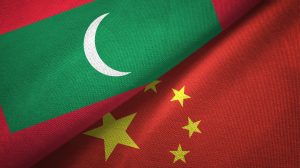New Maldivian President Mohamed Muizzu appeared to have a successful visit to China last week. Breaking the tradition of a new Maldivian president making his first trip to India, Muizzu went to Turkey for his first official visit, followed by the United Arab Emirates for the U.N. climate change meeting, COP28. On the sidelines, Muizzu met with Indian Prime Minister Narendra Modi, and they reportedly “agreed to set up a core group to discuss the multidimensional relations and further deepen ties.”
But things have not been going great for the two countries’ relationship, even before Muizzu assumed office. Muizzu campaigned on an anti-India platform and called for the withdrawal of some 70-odd Indian military personnel from the Maldives. He also said that bilateral agreements with India will be reviewed, while announcing the government’s decision to ditch a hydrographic survey agreement with India. Mohamed Firuzul Abdul Khaleel, undersecretary for public policy at the Maldives president’s office, said in a press conference that the Muizzu government, “in consideration of national security, has decided not to renew the hydrography agreement.” The five-year agreement is to expire in June 2024.
The agreement, signed during Modi’s visit to Malé in June 2019, allowed the Maldives National Defense Force (MNDF) and the Indian Navy to carry out joint hydrographic surveys in Maldivian territorial waters. A media report citing a statement from the Indian High Commission in the Maldives said that the two agencies conducted three joint hydrographic surveys in February-March 2021, April-May 2022, and January-February 2023. According to the statement, the surveys “will generate updated navigational charts/electronic navigational charts” in order to “enhance the navigational safety of ships and enhance the Blue Economy of Maldives.” The cancellation of the agreement was a clear indication of the anti-India stand of the new government.
This became even more evident with Muizzu’s five-day visit to China where he met with several top Chinese leaders including President Xi Jinping, Premier Li Qiang, and Zhao Leji, chairman of the Standing Committee of the National People’s Congress. During the visit, China and the Maldives signed 20 agreements covering a number of areas including strengthening tourism between the two countries, disaster risk reduction, blue economy, and investment in the digital economy. Agreements were signed also to step up the pace of projects under the Belt and Road Initiative (BRI), as well as on a social housing project on Fushidhiggaru Falhu, fisheries products processing factories, and the re-development of roads in Malé and Villimalé. In his meeting with the Chinese premier, Muizzu made a case for enhanced cooperation in e-commerce, the capital Malé development plan, and an airport expansion.
In what may have been particularly pleasing to the Chinese leaders, Muizzu is reported to have said, “We may be small, but that doesn’t give you the license to bully us. We aren’t in anyone’s backyard. We are an independent and sovereign state.” It is clear that Muizzu was targeting India with these comments. India had traditionally played a very critical role in the sovereignty and security of the Indian Ocean Island nation.
After his return from China, Muizzu took another swipe at India saying, “Though we have small islands in this ocean, we have a vast exclusive economic zone of 900,000 square kilometers. Maldives is one of the countries with the biggest share of this ocean. This ocean does not belong to a specific country” – echoing a comment China has often made that Indian Ocean does not belong to India.
In a joint press statement, the two sides made the strongest iteration in terms of “safeguarding” each other’s core interests. China on its part said it “firmly supports the Maldives in upholding its national sovereignty, independence and national dignity, respects and supports the Maldives’ exploration of a development path that suits its national conditions, and firmly opposes external interference in the internal affairs of the Maldives.”
The Maldives similarly endorsed the One China policy by saying that it “is firmly committed to the one-China principle, recognizing that there is but one China in the world, the Government of the People’s Republic of China is the sole legal government representing the whole of China, and Taiwan is an inalienable part of China’s territory. The Maldives opposes any statement or action that undermines China’s sovereignty and territorial integrity, opposes all ‘Taiwan independence’ separatist activities, and will not develop any form of official relations with Taiwan.” The statement added, “The Maldives opposes external interference in China’s internal affairs under any pretext and supports all efforts made by China to achieve national reunification.”
Maldives also publicly backed China’s new concepts such as the Global Development Initiative (GDI), Global Security Initiative (GSI) and the Global Civilization Initiative (GCI) in addition to extending full support for carrying out projects under Belt and Road Initiative (BRI) while appreciating the “selfless help” given by China for the Maldives’ social and economic development.
As Muizzu and the first lady received a ceremonial red carpet welcome at the Great Hall of the People in Beijin, the Maldives’ relations with India were taking a nosedive. In fact, on the day Muizzu landed in China, there was a diplomatic row after three deputy ministers of the Muizzu government made derogatory comments that were disrespectful of India and Modi. The Maldivian High Commissioner to India, Ibrahim Shaheeb, was summoned by the Indian Ministry of External Affairs. In response, Muizzu is reported to have suspended the three deputy ministers – Maryam Shiuna, Malsha Shareef, and Mahzoom Majid.
Prior to Muizzu’s visit, Maldivian Vice President Hussain Mohamed Latheef visited China on his first foreign trip, wherein he participated in the China-sponsored China-Indian Ocean Region Forum in Kunming.
What the Maldives is trying to do is nothing unique. Given the presence of two major powers in its neighborhood, Malé is playing India and China against each other and trying to get the best deal, but Muizzu appears to have gone a bit overboard this time.

































